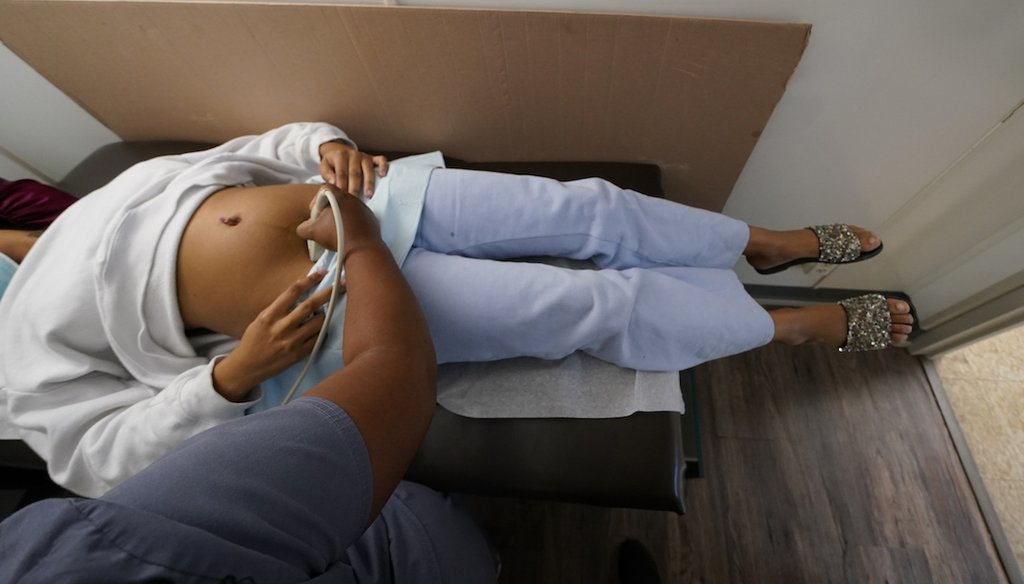

Our only agenda is to publish the truth so you can be an informed participant in democracy.
We need your help.


A woman has an ultrasound to verify her pregnancy inside the Hope Medical Group for Women in Shreveport, La., on April 15, 2022. (AP)
A pregnancy test detects the presence of the pregnancy hormone human chorionic gonadotropin, or hCG, in a person’s body. But the body doesn’t produce that hormone until several days after conception.
Fertilization, which is what most people think of when they refer to conception, happens when the sperm and egg unite.
HCG is produced after the fertilized egg implants in the uterine lining. The timing of implantation can vary, but medical experts say it takes several days — rendering it impossible to find out you’re pregnant the day after conception.
Since the U.S. Supreme Court overturned Roe v. Wade in 2022, the abortion issue has been an easy motivator for Democrats and a political loser at the ballot box for Republicans nationwide.
Wisconsin Republicans, too, have struggled to weather that particular political storm. In January, a group of them proposed a bill marketed as a way to find consensus: a 14-week abortion ban that would have to be approved by voters before taking effect.
The bill would scale the timeframe for legal abortions in Wisconsin back from 20 weeks and is currently sitting with the state Senate after passing the Assembly Jan. 25.
Though the bill was ultimately amended to include exceptions for pregnancies resulting from rape or incest, it didn’t have them initially.
When asked during an Assembly committee hearing on the bill why it didn’t include those exceptions, state Rep. Amanda Nedweski, R-Pleasant Prairie — who co-authored the bill — said 14 weeks should be enough time for a person to be aware of a pregnancy and decide whether to continue that pregnancy.
In fact, Nedweski said, "we have technology and medical advancements today that can tell you if you are pregnant the day after conception."
Medical experts disagree.
Nedweski’s office did not return a request for the evidence she used to make the claim. We’ll break down the science here.
A pregnancy test detects the presence of the pregnancy hormone human chorionic gonadotropin, or hCG, in a person’s body. But the body doesn’t produce that hormone until several days after conception.
Fertilization, which happens when the sperm and egg unite, is what most people refer to as "conception," said Dr. Abigail Cutler, an OB-GYN at UW Health and assistant professor of obstetrics and gynecology at the University of Wisconsin School of Medicine and Public Health.
About five to 10 days after fertilization, the fertilized egg implants in the lining of the uterus. HCG is produced shortly afterward, Cutler said, first in low levels which rise rapidly over time.
"The very earliest someone can confirm whether they are pregnant is following implantation, the timing of which varies but can take a week or more," she said.
Pregnancy tests that people can buy over the counter, which detect the presence of hCG in urine, often aren’t sensitive enough to pick up those lowest levels of the hormone when it first appears, she added. An hCG blood test can detect the hormone as soon as it’s being produced, but that kind of test isn’t as readily accessible because it must be ordered by a health care provider.
Other medical information supports that hCG doesn’t show up immediately after conception, though its timing can vary.
According to the Cleveland Clinic, hCG can be found in a person’s blood around 11 days after conception, and it takes slightly longer to show up in urine. Johns Hopkins Medicine says it can be found in urine five to seven days after conception. Mount Sinai Health System says hCG can be found in the blood and urine of pregnant people as early as 10 days after conception.
Cutler also noted that confirming a pregnancy by any means requires having a reason to suspect pregnancy in the first place.
According to SSM Health, some people may begin noticing early symptoms of pregnancy a week or two after conception. But others may not realize until their period is noticeably late — which can be hard to determine for people with irregular menstrual cycles — or even further into the pregnancy. Some people feel no symptoms at all.
With that information in mind, Cutler said there are many reasons why someone may not suspect a pregnancy until it is several weeks along.
Nedweski claimed that there are "technology and medical advancements today that can tell you if you are pregnant the day after conception."
But pregnancy tests are looking for a hormone that doesn’t get produced right after conception. It could take a week or more to be produced in high enough levels to show up on a pregnancy test, even one done by a health care provider.
We rate this claim False.
The Hill, "Republicans struggle for way out of abortion quagmire," Nov. 9, 2023
Milwaukee Journal Sentinel, "Wisconsin Republican lawmakers introduce 14-week abortion ban. Evers promises veto," Jan. 19, 2024
Milwaukee Journal Sentinel, "Assembly passes referendum on 14-week abortion ban that faces certain Evers veto," Jan. 25, 2024
Milwaukee Journal Sentinel, "Republicans amend 14-week abortion ban measure to include rape and incest exceptions," Jan. 23, 2024
Milwaukee Journal Sentinel, "Co-author of 14-week abortion ban bill defends leaving out exceptions for rape or incest," Jan. 22, 2024
Email exchange with Dr. Abigail Cutler, UW Health, University of Wisconsin School of Medicine and Public Health
Cleveland Clinic, Conception, accessed March 5, 2024
Johns Hopkins Medicine, HCG (Urine,) accessed March 5, 2024
Mount Sinai Health System, HCG blood test – quantitative, accessed March 5, 2024
SSM Health, 12 early signs of pregnancy, April 8, 2022
In a world of wild talk and fake news, help us stand up for the facts.
